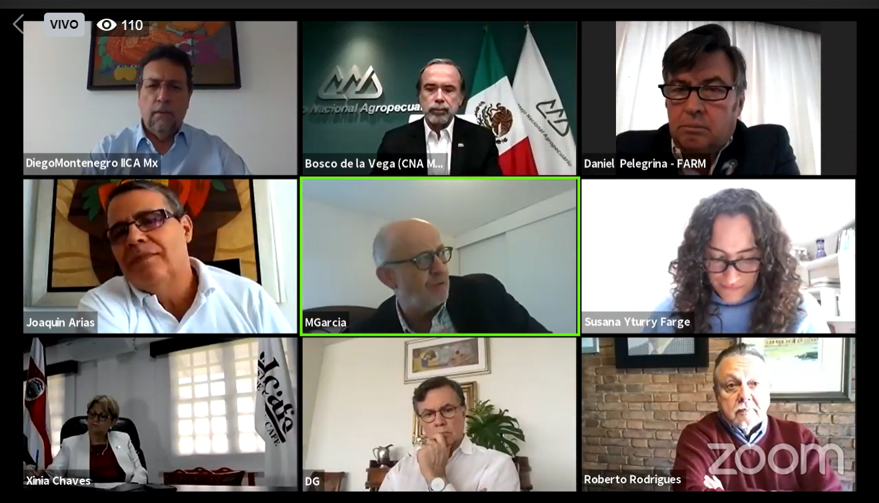The sector called for establishing a solid partnership with governments and society to reactivate countries’ economies and advance towards food security.

Mexico City, 6 July 2020 (IICA). Specialists participating in the Hemispheric Virtual Agribusiness Forum, organized by the Inter-American Institute for Cooperation on Agriculture (IICA), agreed that the crisis generated by the COVID-19 pandemic has demonstrated the need for a renewed vision for the agrifood sector in Latin America, as well as the private sector’s strategic role in reactivating countries’ economies.
The officials, entrepreneurs and producers in attendance discussed the role that the agrifood sector must play and the actions it must undertake to meet the needs arising from the pandemic. They noted that a renewed vision of multilateralism, productivity and sustainability, as well as effective public policies, would allow for driving the development of nations.
The forum began with the presentation of the results of a survey conducted among 27 Latin American and Caribbean entrepreneurs, who considered that the private sector’s new role should be geared towards improving innovation, trade, strategic partnerships and the integration of value chains, as well as diversifying markets and prioritizing the health of employees.
In his welcoming remarks, the Director General of IICA, Manuel Otero, stressed the fact that the current health crisis triggered by the coronavirus pandemic affords an opportunity to create new visions for development and for the agrifood sector to take on a strategic role in economic reactivation.
Miguel García Winder, Undersecretary of Agriculture of Mexico, stated that, although the COVID-19 pandemic has exposed the weaknesses of agricultural systems across the hemisphere, it has also provided an opportunity to reassess the roles and actions of the public and private sectors.
Víctor Villalobos, Secretary of Agriculture and Rural Development of Mexico, highlighted the possibility to restructure food systems so that they focus on improving society’s well-being, as well as the opportunity for the agribusiness sector to transform its operating schemes and the manner in which it delivers its services to consumers.
“It is our responsibility to keep trade flowing and to strengthen the government institutions that contribute to research, innovation and education, in order to anticipate future needs”, he remarked.
Roberto Rodrigues, former Minister of Agriculture of Brazil, stressed the need to establish a strong partnership between the public and private sectors to improve food production and supply, as well as foster a rapprochement with Latin American parliaments to update laws for the benefit of the agrifood sector.
He noted that digitalization, connectivity and automation must be incorporated into work carried out on the field, and underscored the need to train technical specialists who assist small-scale farmers, especially cooperative members, during the post-COVID-19 phase.
“It will be crucial for producers and national governments to act in an integrated manner to avoid injustice or discrimination, especially by rich countries towards exporting countries. Different governments must also undertake joint efforts to ensure that potential protectionist rules do not cause disasters for rural producers, especially small-scale famers”, he noted.
Susana Yturry, Agroexports Manager for the Association of Exporters (ADEX); Xinia Chávez, Executive Director of the Costa Rican Coffee Institute (ICAFÉ); Daniel Pelegrina, Vice-President of the Federation of Rural Associations of Mercosur (FARM) and Vassel Stewart, President of the Caribbean Agribusiness Association, stressed the fact that the pandemic opened up a window of opportunity to improve production, diversify markets and improve the use of technologies.
They highlighted the need to build a well-prepared, competitive and innovative sector with solid public and private partnerships. They also agreed that, in order to address the unprecedented health, economic, social and environmental crisis brought on by the pandemic, governments would need to drive active and timely participation by the private agriculture sector and organized civil society. In this regard, they noted that the pandemic had revealed the fragility of economies across the region and demonstrated the need to reenvision future agrifood and energy agendas.
Bosco de la Vega, President of Mexico’s National Agricultural Council (CNA), described the sector’s new role in building a renewed agenda to improve the flow of trade in agricultural products. He also noted that we must acknowledge the importance of health as well as food safety and traceability.
Speaking to more than 300 participants from LAC, he remarked that improving small-scale producers’ access to new technologies was a challenge. He also highlighted the need to develop public policies based on the new reality, in order to ensure that the agrifood sector can play a leading role in the development of nations.
The event also included the transmission of a video message by the Secretary of Agriculture and Rural Development of Mexico, Victor Villalobos, in which he urged all sectors to undertake coordinated efforts to guide the development of new policies for the agrifood sector in Mexico and the rest of Latin America, in response to the COVID-19 pandemic.
More information:
Diego Montenegro, IICA Representative in Mexico.
diego.montenegro@iica.int











